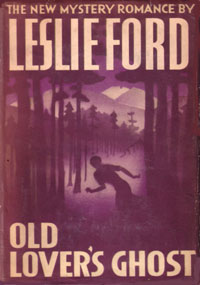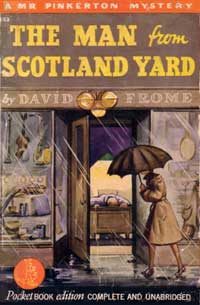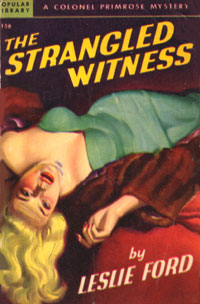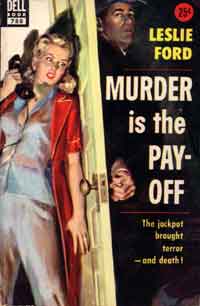"Connie Maynard stopped a moment at the foot of the stairs and returned the critical unsmiling survey of the girl standing there in the looking glass across the bank of great tawny bronze chrysanthemums -her hair was tawny bronze like herself, like the chrysanthemums-her hair and her smooth sun-tanned skin-except that her eyes were yellow-green and her green taffeta off-the-shoulder dress clothed her with infinitely more art than chrysanthemum leaves ever have in mind. Constance Maynard regarded herself coolly there for a moment, then turned and crossed the hall into the library, the green taffeta swishing softly and with complete confidence as she moved."
Murder is the Pay-off (1951)
 Portrait of a Southern belle, circa the 1950s. Rock and roll, the Space Race, Nuclear testing and the rise of Suburbia all served to shape this conservative decade, but here in the ultra-civilized world of Leslie Ford, the pen name Zenith Ford Brown used for her American novels, time stands still--and it is a gentler and more gracious time. Barring those unpleasant and frequent murders. Portrait of a Southern belle, circa the 1950s. Rock and roll, the Space Race, Nuclear testing and the rise of Suburbia all served to shape this conservative decade, but here in the ultra-civilized world of Leslie Ford, the pen name Zenith Ford Brown used for her American novels, time stands still--and it is a gentler and more gracious time. Barring those unpleasant and frequent murders.
Like white gloves and seamed stockings, Leslie Ford is greatly out of fashion these days. Worse, she's considered politically incorrect--ironic, when you reflect how many of her novels revolved around Washington and politics. The world Ford wrote of, the world of old money and good family, a world where a woman needed education and career training less than beauty, brains and breeding, no longer exists. It had ceased to exist by the 50s, let alone 1962 when Ford wrote her final novel, Trial by Ambush, but Ford was a product of the Golden Age of mystery writing--and her love of the “good old days” colors her work.
Speaking of color, Ford takes a lot of heat for her portrayal of blacks (in particular). In Ford's world, blacks are servants. They can be efficient shadow servants or comical relief Aunt Jemima and Stepin' Fetchits, but they are never the equal of the white moneyed principals that people Ford's puzzles. African-Americans are viewed with affectionate tolerance. This apparently offends some critics, but Ford (like all of us) was a product of her generation and background, and her attitudes reflect the social mores and beliefs of her class and era. More importantly, they reflect the beliefs and attitudes of the characters she is writing about. It would be nice if folks in the 30s, 40s, 50s and even 60s had been as enlightened as we are now, but there is little point in trying to revise history.
I could hear the dark mutterings of Lilac, my cook, downstairs, and the violent swish, swish of her broom. In our twenty years of mutual oppression, she's never learned anymore philosophy than I have.
The Woman in Black (1948)
 Ford's first novel was written in 1929 under the pseudonym David Frome. She was living in London at the time, and she wrote a classic English Golden Age murder novel set in an England that even then was changing. She wrote so convincingly of this vanishing empire, that most of her reading public believed she was English. Ford's first novel was written in 1929 under the pseudonym David Frome. She was living in London at the time, and she wrote a classic English Golden Age murder novel set in an England that even then was changing. She wrote so convincingly of this vanishing empire, that most of her reading public believed she was English.
This nostalgic love of the past, the appreciation for the way things were, is especially strong in Ford's early novels. In the Frome novels, she writes of an England that existed mostly before World War II. In the Ford novels, she writes of America during the war and the changes it imposes on society--that would be Society with a capital 'S.' Wealth is probably the single most important theme in Ford's novels. Money--or rather Greed--is almost without variance the motive for murder in her work. But even her protagonists understand the importance of cold hard cash.
Money. It's a good thing. And old money is better than new.
So, you might be wondering what a Socialistic-minded tyke like myself finds so appealing in Ford's work?
For one thing, she's a very good writer. Hers is a fluid, unpretentious style that's easy to underestimate. Her choice of language, her imagery; it's all seamless, almost invisible. She creates a vivid scene and sharp characters with a minimum of fuss and embellishment. She writes with humor and a gentle irony, especially when she writes of her two series characters, Grace Latham and Mr. Evan Pinkerton. Her humor is especially delicious when she's chronicling the misadventures of poor little Mr. Pinkerton.
Secondly, her main characters are almost always observers and not participants in the mystery, and this gives her stories a pleasantly removed quality. There's no real tension, no real suspense. They are cerebral exercises, but with better characters and more sophisticated humor than one generally finds in the classic Golden Age puzzle.
 Frankly, I find these stories comforting -- written during the Second World War, they demonstrate first hand that life goes on, that sacrifices must be made but that they do not mean the end of the world. Traditions matter, family and friends matter. Loyalty is paramount. Both Grace Latham and Mr. Pinkerton are not above concealing evidence when they believe the police have zeroed in on an innocent friend or acquaintance. Frankly, I find these stories comforting -- written during the Second World War, they demonstrate first hand that life goes on, that sacrifices must be made but that they do not mean the end of the world. Traditions matter, family and friends matter. Loyalty is paramount. Both Grace Latham and Mr. Pinkerton are not above concealing evidence when they believe the police have zeroed in on an innocent friend or acquaintance.
Instinct is generally the means by which both Pinkerton and Latham solve their “cases,” but neither of them can really take honors as a sleuth since both of them are a kind of Watson (or occasionally Moriarty) to the real sleuths: Colonel John Primrose (Grace's indulgent beau) and Inspector Bull (Mr. Pinkerton's good friend). This allows Grace and Mr. Pinkerton to have lots of fun jumping to wrong conclusions, misdirecting law enforcement and getting hit over the head. (Grace, in particular, gets hit over the head A LOT. Though not, one must point out, as much as Nancy Drew.)
“Well, well,” he said slowly. “This is wonderful. I…never thought I'd get to the point where I'd have to have four year olds doing my detecting.”
He got up. “I'm going next door. Would you like to come?”
“I'd love to,” I said. “And I'm sorry I've been so stupid.”
He took my hand.
“I shouldn't have been irritated at you. I ought to be used to you by now. Lord knows you've made me trouble enough. However, you've just said two things…In any case, I'm really very --”
“Yes, I know,” I said.
He smiled and let go my hand. “I suppose it isn't the best time to tell you that I-”
“No, it isn't,” I interrupted.
Siren in the Night (1944)
Despite the fact that Ford wrote strong and memorable female characters, it would be a mistake to call her a feminist -- at least in the contemporary sense. Ford held traditional and conventional views about relationships and the institution of marriage, but the assumption that these views precluded resilient, independent-minded females simply shows a lack of understanding about how the world Ford grew up in worked.
 Grace Latham may make mistakes, she may be impulsive and a little headstrong, but she is a strong, self-reliant woman: a widow who raised two small boys on her own, a society woman who successfully navigates the treacherous waters of Washington politics, a loyal friend and ally. Whether she and Colonel Primrose are actually lovers is unknown, but they are certainly longtime companions; yet Grace clearly resists (gracefully) the Colonel's efforts to get her to commit to something more permanent (or at least more formal). Although finding and keeping true love (against the odds) is a persistent theme in her work, Ford sidesteps this fate for both her protagonists. Mr. Pinkerton was wretched in his marriage, while Grace was happy, but both of them are content in their single state. Grace Latham may make mistakes, she may be impulsive and a little headstrong, but she is a strong, self-reliant woman: a widow who raised two small boys on her own, a society woman who successfully navigates the treacherous waters of Washington politics, a loyal friend and ally. Whether she and Colonel Primrose are actually lovers is unknown, but they are certainly longtime companions; yet Grace clearly resists (gracefully) the Colonel's efforts to get her to commit to something more permanent (or at least more formal). Although finding and keeping true love (against the odds) is a persistent theme in her work, Ford sidesteps this fate for both her protagonists. Mr. Pinkerton was wretched in his marriage, while Grace was happy, but both of them are content in their single state.
Of the Ford novels, my personal favorites are Siren in the Night and The Simple Way of Poison, but I don't believe I've ever read one I didn't enjoy. I discovered Ford in my 20s and she remains one of my preferred writers. I'm pleased to say that I haven't read all of the novels listed in the bibliography (and I've read even fewer of the David Frome's), so many pleasures still await. Perhaps they await you as well!
NOVELS AS LESLIE FORD
(pseudonym of Zenith Jones Brown, 1898-1983)
Footsteps On The Stairs (1931)
Murder In Maryland (1933)
Mountain Madness (1935)
Ill Met By Moonlight (1937)
The Simple Way Of Poison (1938)
Three Bright Pebbles (1939)
Mr. Cromwell Is Dead (1939)
The Town Cried Murder (1939)
Snow White Murder (1940)
Road To Folly (1941)
A Capital Crime (1941)
Murder Down South (1942 The Priority Murders (1943)
Siren In The Night (1944)
Crack Of Dawn (1945)
The Phildelphia Murder Story (1945 Honolulu Murder Story (1947)
The Woman In Black (1948)
The Devil's Stronghold (1948)
Shot In The Dark (1949)
Murder Is The Pay-Off (1951)
The Bahamas Murder Case (1952)
The Lying Jade (1953)
Invitation To Murder (1955)
Murder Comes To Eden (1956)
The Girl From The Mimosa Club (1957)
Trial From Ambush (1962)
NOVELS AS DAVID FROME
(pseudonym of Zenith Jones Brown, 1898-1983)
In At The Death (1929)
The Murder Of An Old Man (1929)
The Hammersmith Murders (1930)
The Murder On The Sixth Hole (1931)
The By-Pass Murder (1932)
Mr. Simpson Finds A Body (1933)
The Eel Pie Mystery (1933)
'That's Your Man, Inspector (1934)
Arsenic In Richmond (1934)
The Body In The Turl (1935)
The Body In Bedford Square (1935)
Mr. Pinkerton Has The Clue (1936)
The Guilt Is Plain (1938)
Mr. Pinkerton And The Old Angel (1939)
Murder On The Square (1951)
|

 Portrait of a Southern belle, circa the 1950s. Rock and roll, the Space Race, Nuclear testing and the rise of Suburbia all served to shape this conservative decade, but here in the ultra-civilized world of Leslie Ford, the pen name Zenith Ford Brown used for her American novels, time stands still--and it is a gentler and more gracious time. Barring those unpleasant and frequent murders.
Portrait of a Southern belle, circa the 1950s. Rock and roll, the Space Race, Nuclear testing and the rise of Suburbia all served to shape this conservative decade, but here in the ultra-civilized world of Leslie Ford, the pen name Zenith Ford Brown used for her American novels, time stands still--and it is a gentler and more gracious time. Barring those unpleasant and frequent murders. Ford's first novel was written in 1929 under the pseudonym David Frome. She was living in London at the time, and she wrote a classic English Golden Age murder novel set in an England that even then was changing. She wrote so convincingly of this vanishing empire, that most of her reading public believed she was English.
Ford's first novel was written in 1929 under the pseudonym David Frome. She was living in London at the time, and she wrote a classic English Golden Age murder novel set in an England that even then was changing. She wrote so convincingly of this vanishing empire, that most of her reading public believed she was English. Frankly, I find these stories comforting -- written during the Second World War, they demonstrate first hand that life goes on, that sacrifices must be made but that they do not mean the end of the world. Traditions matter, family and friends matter. Loyalty is paramount. Both Grace Latham and Mr. Pinkerton are not above concealing evidence when they believe the police have zeroed in on an innocent friend or acquaintance.
Frankly, I find these stories comforting -- written during the Second World War, they demonstrate first hand that life goes on, that sacrifices must be made but that they do not mean the end of the world. Traditions matter, family and friends matter. Loyalty is paramount. Both Grace Latham and Mr. Pinkerton are not above concealing evidence when they believe the police have zeroed in on an innocent friend or acquaintance.  Grace Latham may make mistakes, she may be impulsive and a little headstrong, but she is a strong, self-reliant woman: a widow who raised two small boys on her own, a society woman who successfully navigates the treacherous waters of Washington politics, a loyal friend and ally. Whether she and Colonel Primrose are actually lovers is unknown, but they are certainly longtime companions; yet Grace clearly resists (gracefully) the Colonel's efforts to get her to commit to something more permanent (or at least more formal). Although finding and keeping true love (against the odds) is a persistent theme in her work, Ford sidesteps this fate for both her protagonists. Mr. Pinkerton was wretched in his marriage, while Grace was happy, but both of them are content in their single state.
Grace Latham may make mistakes, she may be impulsive and a little headstrong, but she is a strong, self-reliant woman: a widow who raised two small boys on her own, a society woman who successfully navigates the treacherous waters of Washington politics, a loyal friend and ally. Whether she and Colonel Primrose are actually lovers is unknown, but they are certainly longtime companions; yet Grace clearly resists (gracefully) the Colonel's efforts to get her to commit to something more permanent (or at least more formal). Although finding and keeping true love (against the odds) is a persistent theme in her work, Ford sidesteps this fate for both her protagonists. Mr. Pinkerton was wretched in his marriage, while Grace was happy, but both of them are content in their single state.